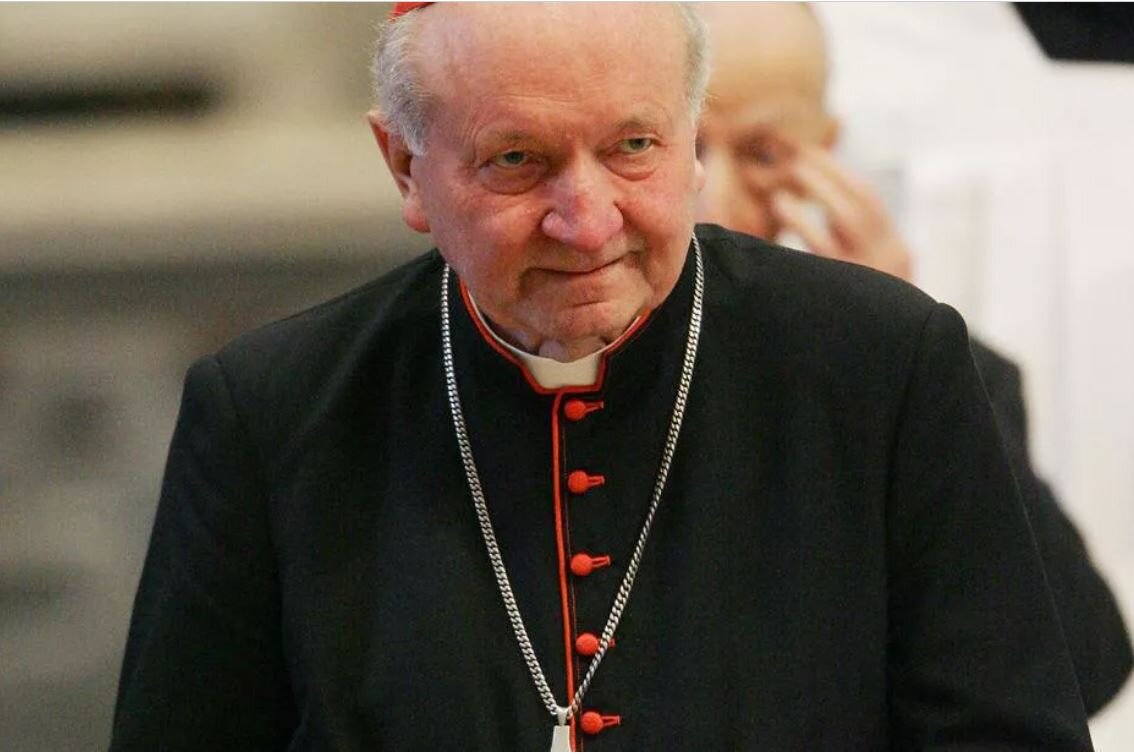Polish Cardinal and Pope St. John Paul II: United in Faith; United in Suffering
National Catholic Register, 10 September 2020
Cardinal Marian Jaworski’s presence at the death of Pope St. John Paul II capped long years at Karol Wojytła’s side.
As Pope St. John Paul II was leaving this world to go to the house of the Father, his longtime friend Cardinal Marian Jaworski gave him viaticum — food for the journey, a few drops of the Precious Blood from the Mass of Divine Mercy Sunday, celebrated in the dying Pope’s room. Cardinal Jaworski, archbishop emeritus of Lviv, Ukraine, has now made the journey himself, dying on Sept. 5.
Cardinal Jaworski’s deathbed presence capped long years at Karol Wojytła’s side. They were young priests together in Kraków and scholars together in the academy.
In 1967, Archbishop Wojtyła asked his fellow philosopher and friend to replace him at a lecture he was booked to give out of town. The train taking Father Jaworski to the lecture crashed; he lost his left arm in the accident. They would henceforth be united in suffering.
As the reconstruction of post-Soviet Ukraine began, John Paul entrusted Father Jaworski with the delicate task of rebuilding and reconciliation, making him archbishop of Lviv. In 1998, John Paul named him — along with Archbishop Jānis Pujats of Riga, Latvia — as cardinals in pectore, meaning that they were secretly appointed. In 2001, their appointments would be revealed.
John Paul never explained why he made the in pectore appointments, but he evidently wanted to demonstrate his closeness to the persecuted Soviet-era Churches. Perhaps he worried about Russian objections in majority Orthodox countries.
Upon the news of Cardinal Jaworski’s death, Pope Francis sent a lengthy message of condolence to the Church in both Poland and Ukraine, indicating the uniqueness of the figure who expressed in his very person the complex history which shaped the life of St. John Paul II.
Cardinal Stanisław Dziwisz, archbishop emeritus of Kraków and John Paul’s personal secretary for 40 years, recalled Cardinal Jaworski as a “witness of a difficult history.” That history included the tensions and the challenges of reconciliation between Poles and Ukrainians, complicated by the long years of Soviet atheism. Cardinal Jaworski lived that extraordinary history. Even now, in death, he accompanies his saintly friend, St. John Paul II.
Marian Jaworski was born in 1926 in Lviv (Ukrainian spelling; “Lwów” in Polish). That city, now in western Ukraine, was at the time part of Poland. Poland recovered its independence in 1918 after the Great War and sat on the map significantly to the east of where it does now. For example, both Lviv and Vilnius (the capital of Lithuania) were part of 1920s Poland.
Prior to recovered independence, both Kraków and Lviv were part of the Habsburg Empire ruled from Austria. John Paul’s father, also Karol Wojtyła, served in the Austrian armed forces. Perhaps that is why, even in old age, John Paul referred in personal conversation not to Lviv (Ukrainian), Lwów (Polish), Lvov (Russian) or even Leopolis (Latin), but “Lemberg,” the Austrian-era German name for the city. He would have no doubt heard his father use that name.
The variety of names indicate the complicated history of Lviv. During the nearly 125 years of rule by the Habsburgs, Kraków and Lviv became sister cities, with cultural leaders moving easily between the two. That was certainly true of ecclesial life. While Lviv served as the seat of the Ukrainian Greek Catholic Church, led for many years by the formidable Metropolitan Andrey Speptytsky, it was also a Latin Rite diocese. Priests and bishops of Kraków and Latin Rite Lviv went back and forth.
With the coming of Polish independence, and the rise of the expansionist Bolsheviks in Moscow, the territories of eastern Poland and western Ukraine came to be contested. Eventually, after World War II and the descent of the Iron Curtain, Poland would move westward on the map, and Lviv would come under communist rule as part of the Ukrainian Soviet Socialist Republic. A fierce religious persecution would follow.
All of this led to tension between Poles and Ukrainians, with resentment of the former by the latter for what they regarded as “polonizing” tendencies. This was the world into which Marian Jaworski was born.
Continue reading at the National Catholic Register.
